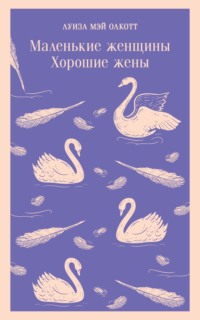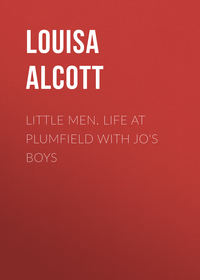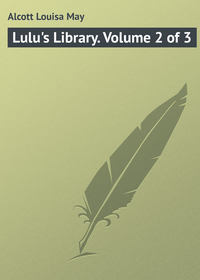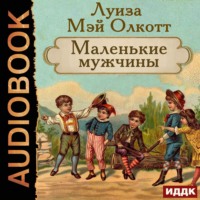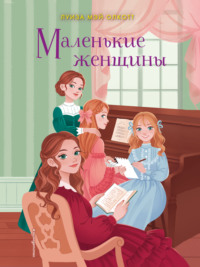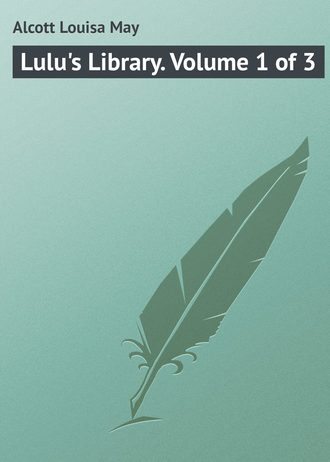 полная версия
полная версияLulu's Library. Volume 1 of 3
"I wish these were seven-leagued boots, like Jack the Giant Killer's; then it would be easy to run errands all the time. Now, I hate to keep trotting, and I don't like new shoes, and I won't stir a step."
Just as she said that, the shoes gave a skip, and set her on her feet so suddenly that it scared all the naughtiness out of her. She stood looking at these curious shoes; and the bright buttons on them seemed to wink at her like eyes, while the heels tapped on the floor a sort of tune. Before she dared to stir, her mother called from the next room, -
"Kitty, run and tell the cook to make a pie for dinner; I forgot it."
"I don't want to," began Kitty, with a whine as usual.
But the words were hardly out of her mouth when the shoes gave one jump, and took her downstairs, through the hall, and landed her at the kitchen door. Her breath was nearly gone; but she gave the message, and turned round, trying to see if the shoes would let her walk at all. They went nicely till she wanted to turn into the china-closet where the cake was. She was forbidden to touch it, but loved to take a bit when she could. Now she found that her feet were fixed fast to the floor, and could not be moved till her father said, as he passed the window close by, -
"You will have time to go to the post-office before school and get my letters."
"I can't," began Kitty; but she found she could, for away went the shoes, out of the house at one bound, and trotted down the street so fast that the maid who ran after her with her hat could not catch her.
"I can't stop!" cried Kitty; and she did not till the shoes took her straight into the office.
"What's the hurry to-day?" asked the man, as he saw her without any hat, all rosy and breathless, and her face puckered up as if she did not know whether to laugh or to cry.
"I won't tell any one about these dreadful shoes, and I 'll take them off as soon as I get home. I hope they will go back slowly, or people will think I 'm crazy," said Kitty to herself, as she took the letters and went away.
The shoes walked nicely along till she came to the bridge; and there she wanted to stop and watch some boys in a boat, forgetting school and her father's letters. But the shoes would n't stop, though she tried to make them, and held on to the railing as hard as she could. Her feet went on; and when she sat down they still dragged her along so steadily that she had to go, and she got up feeling that there was something very strange about these shoes. The minute she gave up, all went smoothly, and she got home in good time.
"I won't wear these horrid things another minute," said Kitty, sitting on the doorstep and trying to unbutton the shoes.
But not a button could she stir, though she got red and angry struggling to do it.
"Time for school; run away, little girl," called mamma from upstairs, as the clock struck nine.
"I won't!" said Kitty, crossly.
But she did; for those' magic shoes danced her off, and landed her at her desk in five minutes.
"Well, I 'm not late; that's one comfort," she thought, wishing she had come pleasantly, and not been whisked away without any luncheon.
Her legs were so tired with the long skips that she was glad to sit still; and that pleased the teacher, for generally she was fussing about all lesson time. But at recess she got into trouble again; for one of the children knocked down the house of corn-cobs she had built, and made her angry.
"Now, I 'll kick yours down, and see how you like it, Dolly."
Up went her foot, but it did n't come down; it stayed in the air, and there she stood looking as if she were going to dance. The children laughed to see her, and she could do nothing till she said to Dolly in a great hurry, -
"Never mind; if you didn't mean to, I'll forgive you."
Then the foot went down, and Kitty felt so glad about it that she tried to be pleasant, fearing some new caper of those dreadful shoes. She began to see how they worked, and thought she would try if she had any power over them. So, when one of the children wanted his ball, which had bounced over the hedge, she said kindly, -
"Perhaps I can get it for you, Willy."
And over she jumped as lightly as if she too were an india-rubber ball.
"How could you do it?" cried the boys, much surprised; for not one of them dared try such a high leap.
Kitty laughed, and began to dance, feeling pleased and proud to find there was a good side to the shoes after all. Such twirlings and skippings as she made, such pretty steps and airy little bounds it was pretty to see; for it seemed as if her feet were bewitched, and went of themselves. The little girls were charmed, and tried to imitate her; but no one could, and they stood in a circle watching her dance till the bell rang, then all rushed in to tell about it.
Kitty said it was her new shoes, and never told how queerly they acted, hoping to have good times now. But she was mistaken.
On the way home she wanted to stop and see her friend Bell's new doll; but at the gate her feet stuck fast, and she had to give up her wishes and go straight on, as mamma had told her always to do.
"Run and pick a nice little dish of strawberries for dinner," said her sister, as she went in.
"I 'm too ti-" There was no time to finish, for the shoes landed her in the middle of the strawberry bed at one jump.
"I might as well be a grasshopper if I 'm to skip round like this," she said, forgetting to feel tired out there in the pleasant garden, with the robins picking berries close by, and a cool wind lifting the leaves to show where the reddest and ripest ones hid.
The little dish was soon filled, and she wanted to stay and eat a few, warm and sweet from the vines; but the bell rang, and away she went, over the wood-pile, across the piazza, and into the dining-room before the berry in her mouth was half eaten.
"How this child does rush about to-day!" said her mother. "It is so delightful to have such a quick little errand-girl that I shall get her to carry some bundles to my poor people this afternoon.
"Oh, dear me! I do hate to lug those old clothes and bottles and baskets of cold victuals round. Must I do it?" sighed Kitty, dismally, while the shoes tapped on the floor under the table, as if to remind her that she must, whether she liked it or not.
"It would be right and kind, and would please me very much. But you may do as you choose about it. I am very tired, and some one must go; for the little Bryan baby is sick and needs what I send," said mamma, looking disappointed.
Kitty sat very still and sober for some time, and no one spoke to her. She was making up her mind whether she would go pleasantly or be whisked about like a grasshopper against her will. When dinner was over, she said in a cheerful voice, -
"I 'll go, mamma; and when all the errands are done, may I come back through Fairyland, as we call the little grove where the tall ferns grow?"
"Yes, dear; when you oblige me, I am happy to please you."
"I 'm glad I decided to be good; now I shall have a lovely time," said Kitty to herself, as she trotted away with a basket in one hand, a bundle in the other, and some money in her pocket for a poor old woman who needed help.
The shoes went quietly along, and seemed to know just where to stop. The sick baby's mother thanked her for the soft little nightgowns; the lame girl smiled when she saw the books; the hungry children gathered round the basket of food, like young birds eager to be fed; and the old woman gave her a beautiful pink shell that her sailor son brought home from sea.
When all the errands were done Kitty skipped away to Fairyland, feeling very happy, as people always do when they have done kind things. It was a lovely place; for the ferns made green arches tall enough for little girls to sit under, and the ground was covered with pretty green moss and wood-flowers. Birds flew about in the pines, squirrels chattered in the oaks, butterflies floated here and there, and from the pond near by came the croak of frogs sunning their green backs on the mossy stones.
"I wonder if the shoes will let me stop and rest; it is so cool here, and I 'm so tired," said Kitty, as she came to a cosey nook at the foot of a tree.
The words were hardly out of her mouth when her feet folded under her, and there she sat on a cushion of moss, like the queen of the wood on her throne. Something lighted with a bump close by her; and looking down she saw a large black cricket with a stiff tail, staring at her curiously.
"Bless my heart! I thought you were some relation of my cousin Grasshopper's. You came down the hill with long leaps just like him; so I stopped to say, How d' ye do," said the cricket, in its creaky voice.
"I 'm not a grasshopper; but I have on fairy shoes to-day, and so do many things that I never did before," answered Kitty, much surprised to be able to understand what the cricket said.
"It is midsummer day, and fairies can play whatever pranks they like. If you did n't have those shoes on, you could n't understand what I say. Hark, and hear those squirrels talk, and the birds, and the ants down here. Make the most of this chance; for at sunset your shoes will stop skipping, and the fun all be over."
While the cricket talked Kitty did hear all sorts of little voices, singing, laughing, chatting in the gayest way, and understood every word they said. The squirrels called to one another as they raced about, -
"Here's a nut, there's a nut;Hide it quick away,In a hole, under leaves,To eat some winter day.Acorns sweet are plenty,We will have them all:Skip and scamper livelyTill the last ones fall."The birds were singing softly, -
"Rock a bye, babies,Your cradle hangs high;Soft down your pillow,Your curtain the sky.Father will feed you,While mother will sing,And shelter our darlingsWith her warm wing."And the ants were saying to one another as they hurried in and out of their little houses, -
"Work, neighbor, work!Do not stop to play;Wander far and wide,Gather all you may.We are never likeIdle butterflies,But like the busy bees,Industrious and wise.""Ants always were dreadfully good, but butterflies are ever so much prettier," said Kitty, listening to the little voices with wonder and pleasure.
"Hollo! hollo!Come down below, -It's lovely and coolOut here in the pool;On a lily-pad floatFor a nice green boat.Here we sit and singIn a pleasant ring;Or leap-frog play,In the jolliest way.Our games have begun,Come join in the fun.""Dear me! what could I do over there in the mud with the queer green frogs?" laughed Kitty, as this song was croaked at her.
"No, no, come and flyThrough the sunny sky,Or honey sipFrom the rose's lip,Or dance in the air,Like spirits fair.Come away, come away;'T is our holiday."A cloud of lovely yellow butterflies flew up from a wild-rose bush, and went dancing away higher and higher, till they vanished in the light beyond the wood.
"That is better than leap-frog. I wish my skipping shoes would let me fly up somewhere, instead of carrying me on errands and where I ought to go all the time," said Kitty, watching the pretty things glitter as they flew.
Just at that minute a clock struck, and away went the shoes over the pool, the hill, the road, till they pranced in at the gate as the tea-bell rang. Kitty amused the family by telling what she had done and seen; but no one believed the Fairyland part, and her father said, laughing, -
"Go on, my dear, making up little stories, and by and by you may be as famous as Hans Christian Andersen, whose books you like so well."
"The sun will soon set, and then my fun will be over; so I must skip while I can," thought Kitty, and went waltzing round the lawn so prettily that all the family came to see her.
"She dances so well that she shall go to dancing-school," said her mother, pleased with the pretty antics of her little girl.
Kitty was delighted to hear that; for she had longed to go, and went on skipping as hard as she could, that she might learn some of the graceful steps the shoes took before the day was done.
"Come, dear, stop now, and run up to your bath and bed. It has been a long hot day, and you are tired; so get to sleep early, for Nursey wants to go out," said her mother, as the sun went down behind the hills with a last bright glimmer, like the wink of a great sleepy eye.
"Oh, please, a few minutes more," began Kitty, but was off like a flash; for the shoes trotted her upstairs so fast that she ran against old Nursey, and down she went, splashing the water all over the floor, and scolding in such a funny way that it made Kitty laugh so that she could hardly pick her up again.
By the time she was ready to undress the sun was quite gone, and the shoes she took off were common ones again, for midsummer day was over. But Kitty never forgot the little lessons she had learned: she tried to run willingly when spoken to; she remembered the pretty steps and danced like a fairy; and best of all, she always loved the innocent and interesting little creatures in the woods and fields, and whenever she was told she might go to play with them, she hurried away almost as quickly as if she still wore the skipping shoes.
V.
COCKYLOO
In the barnyard a gray hen sat on her nest, feeling very happy because it was time for her eggs to hatch, and she hoped to have a fine brood of chickens. Presently crack, crack, went the shells; "Peep, peep!" cried the chicks; "Cluck, cluck!" called the hen; and out came ten downy little things one after the other, all ready to run and eat and scratch, – for chickens are not like babies, and don't have to be tended at all.
There were eight little hens and two little cockerels, one black and one as white as snow, with yellow legs, bright eyes, and a tiny red comb on his head. This was Cockyloo, the good chick; but the black one was named Peck, and was a quarrelsome bad fowl, as we shall see.
Mrs. Partlet, the mamma, was very proud of her fine family; for the eight little daughters were all white and very pretty. She led them out into the farmyard, clucking and scratching busily; for all were hungry, and ran chirping round her to pick up the worms and seeds she found for them. Cocky soon began to help take care of his sisters; and when a nice corn or a fat bug was found, he would step back and let little Downy or Snowball have it. But Peck would run and push them away, and gobble up the food greedily. He chased them away from the pan where the meal was, and picked the down off their necks if they tried to get their share. His mother scolded him when the little ones ran to hide under her wings; but he did n't care, and was very naughty. Cocky began to crow when he was very young, and had such a fine voice that people liked to hear his loud, clear "Cock-a-doodle-doo!" early in the morning; for he woke before the sun was up, and began his song. Peck used to grumble at being roused at dawn, for he was lazy; but the hens bustled up, and were glad to get out of the hen-house.
The father cock had been killed by a dog; so they made Cocky king of the farmyard, and Peck was very jealous of him.
"I came out of the shell first, and I am the oldest; so I ought to be king," he said.
"But we don't like you, because you are selfish, cross, and lazy. We want Cocky; he is so lively, kind, and brave. He will make a splendid bird, and he must be our king," answered the hens; and Peck had to mind, or they would have pulled every feather out of his little tail.
He resolved to do some harm to his good brother, and plagued him all he could. One day, when Cocky was swinging with three of his sisters on a bush that hung over the brook, Peck asked a stupid donkey feeding near to come and put his heavy foot on the bush. He did it, and crack went the branch, splash went the poor chicks into the water, and all were drowned but Cocky, who flew across and was saved. Poor little Hop, Chirp, and Downy went floating down the brook like balls of white foam, and were never seen again. All the hens mourned for them, and put a black feather in their heads to show how sorry they were. Mamma Partlet was heart-broken to lose three darlings at once; but Cocky comforted her, and never told how it happened, because he was ashamed to have people know what a bad bird Peck was.
A butterfly saw it all, and he told Granny Cockletop about it; and the hens were so angry that they turned Peck out of the barnyard, and he had to go and live in the woods alone. He said he did n't care; but he did, and was very unhappy, and used to go and peep into the pleasant field where the fowls scratched and talked together. He dared not show himself, for they would have driven him out. But kind Cocky saw him, and would run with some nice bit and creep through the fence into the wood, saying, -
"Poor brother, I'm sorry for you, and I'll come and play with you, and tell you the news."
Now in this wood lived a fox, and he had been planning to eat Peck as soon as he was fat; for he missed the good corn and meal he used to have, and grew very thin living on grasshoppers and berries. While he waited the sly fellow made friends with Peck, though the bird knew that foxes ate hens.
"I 'm not afraid, and I don't believe old Granny Cockletop's tales. I can take care of myself, I guess," he said, and went on playing with the fox, who got him to tell all about the hen-house, – how the door was fastened, and where the plump chickens roosted, and what time they went to bed, – so that he could creep in and steal a good supper by and by. Silly Peck never guessed what harm he was doing, and only laughed when Cocky said, -
"You will be sorry if you play with the fox. He is a bad fellow; so be careful and sleep on a high branch, and keep out of his way, as I do."
Cocky was fat and large, and the fox longed to eat him, but never could, because he wisely ran home whenever he saw the rogue hiding in the wood. This made Peck angry, for he wanted his brother to stay and play; and so one day, when Cocky ran off in the midst of a nice game, Peck said to the fox, -
"See here, if you want to catch that fellow, I 'll tell you how to do it. He has promised to bring me some food to-night, when all the rest are at roost. He will hide and not get shut up; then, when those cross old biddies are asleep, he will cluck softly, and I am to go in and eat all I want out of the pan. You hide on the top of the hen-house; and while he talks to me, you can pounce on him. Then I shall be the only cock here, and they will have to make me king."
"All right," said the fox, much pleased with the plan, and very glad that Peck had a chance to get fatter.
So when it was night, Peck crept through the broken paling and waited till he heard the signal. Now, good Cocky had saved up nice bits from his own dinner, and put them in a paper hidden under a bush. He spread them all out in the barnyard and called; and Peck came in a great hurry to eat them, never stopping to say, "Thank you."
Cocky stood by talking pleasantly till a little shower came up.
"Peck, dear, put this nice thick paper over you; then you will be dry, and can go on eating. I'll step under that burdock leaf and wait till you are done," said Cocky; and Peck was too busy gobbling up the food to remember anything else.
Now the fox had just crept up on the hen-house roof; and when he peeped down, there was just light enough to see a white thing bobbing about.
"Ah, ha! that's Cockyloo; now for a good supper!" And with a jump he seized Peck by the head before he could explain the mistake.
One squawk, and the naughty bird was dead; but though the paper fell off, and the fox saw what he had done, it was too late, and he began to eat Peck up, while Cocky flew into a tree and crowed so loud that the farmer ran with his gun and shot the fox before he could squeeze through the hole in the fence with the fowl in his mouth.
After that the hens felt safe, for there were no more foxes; and when they heard about Peck they did not mourn at all, but liked Cocky better than ever, and lived happily together, with nothing to trouble them.
King Cockyloo grew to be a splendid bird, – pure white, with a tall red comb on his head, long spurs on his yellow legs, many fine feathers in his tail, and eyes that shone like diamonds. His crow was so loud that it could be heard all over the neighborhood, and people used to say, "Hark! hear Farmer Hunt's cock crow. Is n't it a sweet sound to wake us in the dawn?" All the other cocks used to answer him, and there was a fine matinée concert every day.
He was a good brother, and led his five little sisters all about the field, feeding, guarding, and amusing them; for mamma was lame now, and could not stir far from the yard. It was a pretty sight to see Cocky run home with a worm in his bill or a nice berry, and give it to his mother, who was very proud of her handsome son. Even old Granny Cockletop, who scolded about everything, liked him; and often said, as the hens sat scuffling in the dust, -
"A fine bird, my dears, a very fine bird, and I know he will do something remarkable before he dies."
She was right for once; and this is what he did.
One day the farmer had to go away and stay all night, leaving the old lady alone with two boys. They were not afraid; for they had a gun, and quite longed for a chance to fire it. Now it happened that the farmer had a good deal of money in the house, and some bad men knew it; so they waited for him to go away that they might steal it. Cocky was picking about in the field when he heard voices behind the wall, and peeping through a hole saw two shabby men hiding there.
"At twelve, to-night, when all are asleep, we will creep in at the kitchen window and steal the money. You shall watch on the outside and whistle if any one comes along while I 'm looking for the box where the farmer keeps it," said one man.
"You need n't be afraid; there is no dog, and no one to wake the family, so we are quite safe," said the other man; and then they both went to sleep till night came.
Cocky was much troubled, and did n't know what to do. He could not tell the old lady about it; for he could only cackle and crow, and she would not understand that language. So he went about all day looking very sober, and would not chase grasshoppers, play hide-and-seek under the big burdock leaves, or hunt the cricket with his sisters. At sunset he did not go into the hen-house with the rest, but flew up to the shed roof over the kitchen, and sat there in the cold ready to scare the robbers with a loud crow, as he could do nothing else.
At midnight the men came creeping along; one stopped outside, and the other went in. Presently he handed a basket of silver out, and went back for the money. Just as he came creeping along with the box, Cocky gave a loud, long crow, that frightened the robbers and woke the boys. The man with the basket ran away in such a hurry that he tumbled into a well; the other was going to get out of the window, when Cocky flew down and picked at his eyes and flapped his wings in his face, so that he turned to run some other way, and met the boys, who fired at him and shot him in the legs. The old lady popped her head out of the upper window and rang the dinner-bell, and called "Fire! fire!" so loud that it roused the neighbors, who came running to see what the trouble could be.
They fished one man out of the well and picked up the wounded one, and carried them both off to prison.
"Who caught them?" asked the people.
"We did," cried the boys, very proud of what they had done; "but we should n't have waked if our good Cocky had not crowed, and scared the rascals. He deserves half the praise, for this is the second time he has caught a thief."
So Cocky was brought in, and petted, and called a fine fellow; and his family were so proud of him they clucked about it for weeks afterward.
When the robbers were tried, it was found that they were the men who had robbed the bank, and taken a great deal of money; so every one was glad to have them shut up for twenty years. It made a great stir, and people would go to see Cocky and tell how he helped catch the men; and he was so brave and handsome, they said at last, -
"We want a new weather-cock on our courthouse, and instead of an arrow let us have a cock; and he shall look like this fine fellow."
"Yes, yes," cried the young folks, much pleased; for they thought Cocky ought to be remembered in some way.



